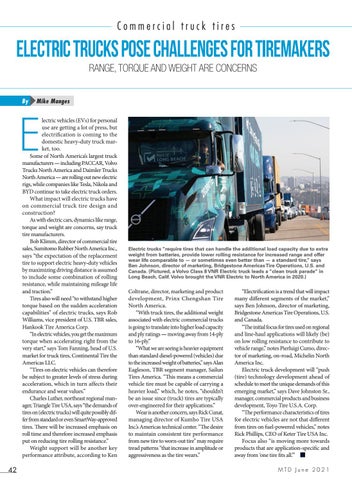Commercial truck tires
ELECTRIC TRUCKS POSE CHALLENGES FOR TIREMAKERS RANGE, TORQUE AND WEIGHT ARE CONCERNS By
Mike Manges
E
lectric vehicles (EVs) for personal use are getting a lot of press, but electrification is coming to the domestic heavy-duty truck market, too. Some of North America’s largest truck manufacturers — including PACCAR, Volvo Trucks North America and Daimler Trucks North America — are rolling out new electric rigs, while companies like Tesla, Nikola and BYD continue to take electric truck orders. What impact will electric trucks have on commercial truck tire design and construction? As with electric cars, dynamics like range, torque and weight are concerns, say truck tire manufacturers. Bob Klimm, director of commercial tire sales, Sumitomo Rubber North America Inc., says “the expectation of the replacement tire to support electric heavy-duty vehicles by maximizing driving distance is assumed to include some combination of rolling resistance, while maintaining mileage life and traction.” Tires also will need “to withstand higher torque based on the sudden acceleration capabilities” of electric trucks, says Rob Williams, vice president of U.S. TBR sales, Hankook Tire America Corp. “In electric vehicles, you get the maximum torque when accelerating right from the very start,” says Tom Fanning, head of U.S. market for truck tires, Continental Tire the Americas LLC. “Tires on electric vehicles can therefore be subject to greater levels of stress during acceleration, which in turn affects their endurance and wear values.” Charles Luther, northeast regional manager, Triangle Tire USA, says “the demands of tires on (electric trucks) will quite possibly differ from standard or even SmartWay-approved tires. There will be increased emphasis on roll time and therefore increased emphasis put on reducing tire rolling resistance.” Weight support will be another key performance attribute, according to Ken
42
04_MTD_CTD-CommerciallyViable.indd 42
Electric trucks “require tires that can handle the additional load capacity due to extra weight from batteries, provide lower rolling resistance for increased range and offer wear life comparable to — or sometimes even better than — a standard tire,” says Ben Johnson, director of marketing, Bridgestone Americas Tire Operations, U.S. and Canada. (Pictured, a Volvo Class 8 VNR Electric truck leads a “clean truck parade” in Long Beach, Calif. Volvo brought the VNR Electric to North America in 2020.)
Coltrane, director, marketing and product development, Prinx Chengshan Tire North America. “With truck tires, the additional weight associated with electric commercial trucks is going to translate into higher load capacity and ply ratings — moving away from 14-ply to 16-ply.” “What we are seeing is heavier equipment than standard diesel-powered (vehicles) due to the increased weight of batteries,” says Alan Eagleson, TBR segment manager, Sailun Tires America. “This means a commercial vehicle tire must be capable of carrying a heavier load,” which, he notes, “shouldn’t be an issue since (truck) tires are typically over-engineered for their applications.” Wear is another concern, says Rick Cunat, managing director of Kumho Tire USA Inc.’s Americas technical center. “The desire to maintain consistent tire performance from new tire to worn-out tire” may require tread patterns “that increase in amplitude or aggressiveness as the tire wears.”
“Electrification is a trend that will impact many different segments of the market,” says Ben Johnson, director of marketing, Bridgestone Americas Tire Operations, U.S. and Canada. “The initial focus for tires used on regional and line-haul applications will likely (be) on low rolling resistance to contribute to vehicle range,” notes Pierluigi Cumo, director of marketing, on-road, Michelin North America Inc. Electric truck development will “push (tire) technology development ahead of schedule to meet the unique demands of this emerging market,” says Dave Johnston Sr., manager, commercial products and business development, Toyo Tire U.S.A. Corp. “The performance characteristics of tires for electric vehicles are not that different from tires on fuel-powered vehicles,” notes Rick Phillips, CEO of Keter Tire USA Inc. Focus also “is moving more towards products that are application-specific and away from ‘one tire fits all.’” MTD June 2021
5/25/21 2:34 PM








